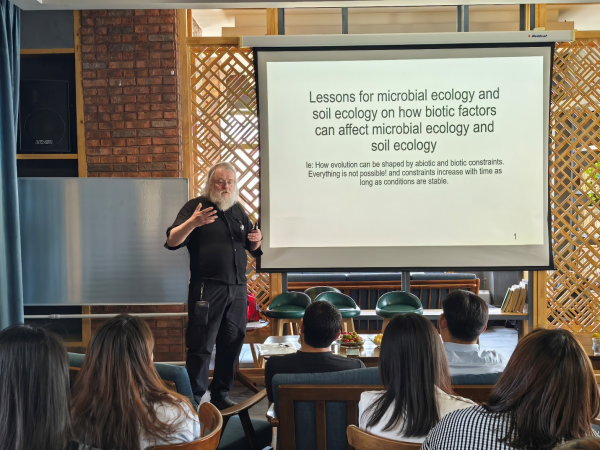XIEG Holds 40th Salon for Scientific Exchange
2025-05-14
On May 9, the Xinjiang Institute of Ecology and Geography (XIEG), Chinese Academy of Sciences, held the 40th "Salon for Scientific Exchange" (SSE). The event featured a presentation by Prof. Stefan Olsson, a Swedish biologist at Fujian Agriculture and Forestry University.
Prof. Olsson delivered a presentation titled Lessons for Microbial Ecology, Soil Ecology, and Molecular Biology: How Biotic Factors Can Affect Microbial and Soil Ecosystems. His presentation elucidated the complex interplay between evolutionary biology and ecological constraints, articulating a critical paradigm: even evolutionarily adapted species remain vulnerable to population collapse under environmental constraints. This theoretical framework provides new insights for addressing sustainability challenges in ecological conservation and biodiversity management.
His presentation offered a comprehensive overview of microbial and fungal interactions, particularly in the context of apoptosis, autophagy, and innate immune responses to bacterial stimuli. By integrating molecular biology, ecology, and advanced analytical techniques, Prof. Olsson illustrated how both biotic and abiotic factors shape the dynamic relationships among plants, fungi, and microbes.
During the Q&A session, participants raised insightful questions on topics ranging from microbial community stability to the ecological impact of soil microbiota on plant health. Prof. Olsson emphasized the importance of interdisciplinary collaboration and continuous research to better understand these intricate ecological networks in a changing global environment.
This event also provided a valuable platform for promoting interdisciplinary dialogue. During the panel session. Dr. Sabina Sharma and Dr. Osama Mohamed shared their research in arid regions, which was highly valued by Prof. Olsson.
Prof. Stefan Olsson is a Swedish biologist and renowned for his pioneering research in microbial ecology, fungal biology, and evolutionary dynamics. His work has significantly advanced the understanding of fungal cellular responses such as apoptosis, autophagy, and innate immunity. By combining molecular biology, ecological theory, and cutting-edge analytical tools, Prof. Olsson investigates how biotic and abiotic factors govern plant–fungi–microbe interaction. His research has not only deepened scientific understanding but also provided critical insights for sustainable agriculture and ecological management.

Stefan Olsson gives his presentation. (Image by XIEG)
Contact
LONG Huaping
Xinjiang Institute of Ecology and Geography
E-mail: longhp@ms.xjb.ac.cn
Web: http://english.egi.cas.cn



